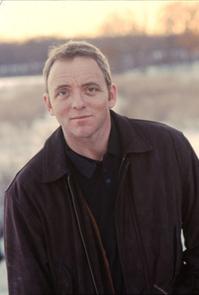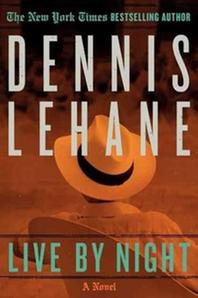
Dennis Lehane has come a long way from the poor, struggling writer who first made a name for himself in 1994 with his debut novel, A Drink Before the War. The possibility that his Shamus Award–winning debut novel might forever label him a genre writer didn't faze Lehane. Instead he celebrated "the greatest accident of [his] life."
That genre label hasn't stuck to Lehane, though. With the publication of Mystic River (and its subsequent movie), Lehane broke through to a wider audience. In a 2001 interview in January magazine, he acknowledged, "The mystery/crime genre has been in a sort of renaissance for about 15 years that's really, finally hitting serious steam. People are standing up and going: Some of these people are really writing good books."
Now, more than a decade later, with the publication of Live by Night (see our review below), the follow-up to his epic novel The Given Day, Lehane said, "If there's any stigma left, I don't hear about it, probably because I don't really roll in circles where, if I did, I'd have to pretend I gave a sh**. There are so many more important things to worry about than how you're perceived by strangers."
Labels or not, Lehane continues to maintain a strong crime element in his writing. "I think the crime novel is where the social novel went (and maybe it's always resided there in some respects). We write about the have-nots and the marginalized, the corrupted dreamers who'd be happy to sell out if only someone would care enough to ask them. If you want to know where America was in the '90s or the aughts, you either listen to hip hop or read crime fiction."
 Social issues abound in Lehane's newest novel. Despite its 1920s setting, the themes of Live by Night are timely. As Lehane points out, "The only difference is that in 1928 we were less stratified and the gulf between the haves and the have-nots wasn't nearly as egregious. Otherwise, same forces at work, same irreconcilable dilemmas, same exploitations of populist rage, same hypocrisy masquerading as moralism, same gutless 'leadership' whoring themselves to the robber barons."
Social issues abound in Lehane's newest novel. Despite its 1920s setting, the themes of Live by Night are timely. As Lehane points out, "The only difference is that in 1928 we were less stratified and the gulf between the haves and the have-nots wasn't nearly as egregious. Otherwise, same forces at work, same irreconcilable dilemmas, same exploitations of populist rage, same hypocrisy masquerading as moralism, same gutless 'leadership' whoring themselves to the robber barons."
Live by Night is the second book in what will be a trilogy. That wasn't Lehane's plan when he set out to write The Given Day, however. "The Given Day was so large-scale I didn't want to even think of something else while I was writing it. Even so, I've always wanted to write a gangster novel, so during the four years I spent on The Given Day, in the farthest rear corners of my mind, I kept liking Joe as a gangster. His emotional and psychological bio felt apt. So when I finished that book, I thought, 'So what happens to Joe?' "
The answer to that question became Live by Night. Lehane follows Joe through the Roaring Twenties, running rum, becoming a gangster, falling in love. And a Fitzgeraldesque aura permeates the story. Was it intentional? "Fitzgerald casts his shadow over just about every American novel that came after him. When it comes to a novel set in the mid-'20s, he looms so large that if I'd considered him I would have been paralyzed."
Also notable in Live by Night is a likeness between Joe and Lehane himself, "Joe and I probably share a lot of the same chips on our shoulders. He's also not as smart as he thinks he is, and neither am I most days. And then, yeah, there are maybe pieces of both of us that simply don't know how to fit. I didn't carve out the path I did as a writer because I was trying to rebel. I wasn't trying to stick it to the literary fiction establishment by writing elegant pulp, if you will, and I wasn't trying to stick it to the mystery fiction establishment when I rejected genre constraints. I was just writing a novel as organically as I could. There was never a plan besides that. If I was any good at belonging to clubs or toeing lines, I wouldn't have become a writer in the first place. I'm a square peg and the world's a round hole. And I'm cool with that because I have no idea how to be anything else."
One defining characteristic of Dennis Lehane's novels is his Boston setting. Each of his books has exhibited Lehane's particular view of the city he loves. But in a geographical twist, Live by Night takes Lehane and Joe Coughlin out of Boston and to Ybor City, Fla. The loss of a story element that has consistently worked for a writer might create challenges for some, but Lehane seems to easily slide into this new setting. "I live part of the year in St. Petersburg, went to college there, and have misspent several nights of my life just across the bay in Ybor City. I love urban landscapes, particularly when they're near water, and Ybor fits that bill. Plus, the history of it is filled with revolutionaries and music and gangsters and sultry women and long, electric nights; in its heyday, it was essentially Casablanca in West Central Florida. Once I hipped to that idea, the whole book opened up for me."
In fact, Live by Night seems to be a book just demanding to be written. In earlier interviews, Lehane noted that A Drink Before the War went through about a dozen drafts before it was ready for publication. But with Live by Night, he said, "I knew every move to make without knowing how I knew." Is it a growth process? Has the revision process diminished with time and experience? "Every book's different. I wish I had the process nailed by now, but I'm not even close. Live by Night went through a few drafts but nothing extreme. It came out pretty easily and remained that way through the edits. By contrast, the book I'm writing now, which follows Joe Coughlin during the 1940s, has been a brutal writing experience. There's no rhyme or reason to it that I can find."
While the question of whether Lehane finds a rhyme or reason to the process of writing is still unknown, he's obviously found a rhyme and reason to the outcome. Live By Night is a stunning gangster novel and at its core a love story; the movie rights have already been snatched up by Warner Brothers. And if that's not enough for one year, Lehane is also launching a HarperCollins imprint bearing his name. It begins with Attica Locke's The Cutting Season. Anyone else out there flying under the radar we should watch out for? Lehane suggests "James Carlos Blake." Great, someone to check out right after reading Live by Night. --Jen Forbus of Jen's Book Thoughts

